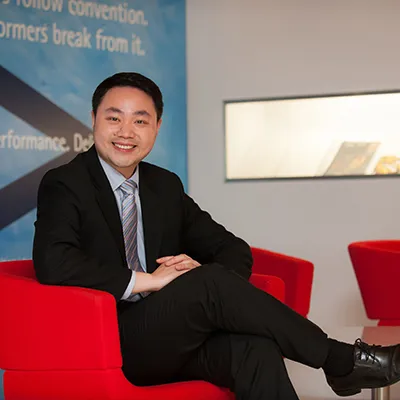An inaugural roadmap that lays out Singapore's plan to leverage artificial intelligence (AI) to transform the economy was unveiled on Wednesday, in the country's most ambitious push yet to become a global AI powerhouse.
The launch of Singapore's National AI Strategy is the next step of its "Smart Nation" journey, said Deputy Prime Minister Heng Swee Keat at the Singapore FinTech Festival and Singapore Week of Innovation and TeCHnology (SFF x SWITCH) conference.
"Singapore is ready to deploy AI on a national scale," he told the audience. "We aim to be a leader in developing and deploying AI solutions by 2030."
Even as global superpowers US and China currently dominate the AI space, Singapore is signalling that it, too, wants a slice of the pie.
To that end, a National AI Office will be created to consolidate efforts on this front. Over S$500 million has been set aside under the Research, Innovation and Enterprise 2020 Plan.
AI - one of the new frontiers in technology - is described as the capability to simulate intelligent, human-like behaviour in computers, and can apply to many fields.
An initial tranche of five national projects identified as key areas will kickstart Singapore's AI plans, said Mr Heng, who is concurrently Minister for Finance. The AI projects are in Transport and Logistics, Smart Cities and Estates, Healthcare, Education and Safety and Security.
They will guide investments in research and development, and in developing supporting digital infrastructure.
In healthcare, for instance, Mr Heng pointed out that there is "great potential" for AI to be applied to the prediction, detection and management of chronic diseases. "AI can be used to analyse clinical and genomic data, medical images and health behaviours to better assess the risk profile of individual patients for better prevention and care management," he said.
But three factors govern the capacity for Singapore's AI strategy to take off: a ready workforce, openness and collaboration, and good governance.
Mr Heng said the first factor, that of building a ready workforce, entails taking a "human-centric" approach to new technology, and ensuring that workers are equipped with the right skills.
Singapore aims to grow a strong core of research scientists, developers, engineers, product managers and entrepreneurs, with plans to train 25,000 professionals in basic AI coding and implementation by 2025, he said.
Under this drive, the Singapore University of Technology and Design and the Infocomm Media Development Authority are working together to deepen AI capabilities to build future "smart estates".
Secondly, in the area of openness and collaboration, the Republic will work with key overseas players in the AI field, even as it solidifies partnerships between the research community, industry and the government to drive innovation. One example is the launch of national platform AI Makerspace on Wednesday, which will enable smaller enterprises to jumpstart their AI journey by providing them with access to data, AI libraries and supercomputing resources, noted Mr Heng.
The final chess piece to fulfilling Singapore's AI vision is good governance. This comes as opening up new frontiers will make for greater risk exposure, he noted. "Engineers tend to ask 'Can it be done?'; entrepreneurs and venture capitalists ask 'Can it make money?'
"We now have to ask two more questions: 'Should it be done?' and 'How should it be done?'"
To address key ethical and governance issues, Singapore published Asia's first Model AI Governance framework this year, he said.
Mr Heng also announced that the Monetary Authority of Singapore (MAS) will be working with partners on an initiative known as Veritas, a framework for financial institutions to utilise open-source tools to ensure the responsible adoption of AI and data analytics.
For a start, Veritas will focus on three areas: customer marketing, risk scoring and fraud detection. The Veritas consortium has 17 members, comprising MAS, SGInnovate, EY and 14 financial institutions.
Analysts and industry watchers have lauded the government's national AI strategy as a timely and major step forward.
Professor Isaac Ben Israel, chairman of Israel Space Agency, the co-chair of Israel's National Task Force for AI and director of the Blavatnik Cyber Research Centre in Tel-Aviv University, said: "Singapore has all the ingredients to be, within a decade or so, a world leader in this emerging technology."
He cited Singapore's education system, knowledge-based economy and sound governance as some of its key success factors.
Dr Andrew Ng, founder and chief executive of Palo Alto-based Landing AI, concurred on Singapore's strong foundation to carry it off. Silicon Valley and Beijing have been global leaders in AI research and developing AI-first startups, he noted, but expressed confidence that Singapore can become a leading player in advancing AI solutions. "Singapore has all the pieces needed to become a regional AI hub," he added.
Copyright © 2019 Singapore Press Holdings
This article was written by Vivien Shiao from The Singapore Business Times and was legally licensed through the NewsCred publisher network. Please direct all licensing questions to legal@newscred.com.






